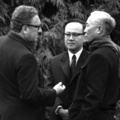"We, the young generation, wish that the differences were obliterated..."
Interview with three young Vietnamese
Having started doing interviews I would like to reach out for representatives of both sides, of course, and via one of my friends I got in touch with a Vietnamese medical student living here in Hungary, and I had the opportunity to ask her and her friends a few questions. I wanted to know more about the way they, the younger generation look on the war of their predecessors, but other topics came up, as well. My interviewees, two young ladies, Nha and Thu, plus an energetic young man, Nhat, were born in the 1980s and the 1990s (Nha and Nhat in the South, Thu in the North), several years after the unification of the two Vietnams. (This interview was originally published HERE in Hungarian.)

How did the war affect your families? And what is your personal perception of it?
Nha: Due to our birthday dates, we do not have a lot of things to do with the Vietnam War, but for instance, my dad was born in the sixties, he lived through the war, though he didn't do any combat.
Nhat: The thing about the war, the misconception about the war, I think, is that people usually think there is a lot of hatred going on between the South and the North. That is not really the case. But there are resentments towards the Communist régime right now, because they took away all the stuff when they took control of the country [in 1975]. They went to the South and basically took everything away. Property, money, everything like that, away from the people in the South. And you know what was the reason for that? After the war most of the money was in the South. The minor ethnics people, like the Chinese, they owned a lot of capital. The reason why the Communists wanted to take over that is because the people who did not want to stay under the régime, they could have used this money to rebel. So the first order of business, after the Communists came in, was take away all the money. That way people could not really rebel, could not start another civil war. That is the whole point. And it caused a lot of unsettlements in terms of how they felt. It was unfair and the Communists knew that a lot of hatred was growing towards them. But that was the only way to control. Money speaks. Especially during tough times. So a lot of people in the South, they ran away.
Nha: I've got a family story from my mother's side. My grandparents had seven children. One of them died early, but my third aunt married to a southern army Lieutenant. After the war he was put into a concentration camp. They called it a reeducation camp, but he was a prisoner. When he came back, he was very sick, he had lost the ability to work and while he was in the camp, my aunt, who had been a lawyer under the southern government, was banned from her practice. My other aunt, she went to a law school, she was banned from education, and I have another aunt who graduated from a very high honor English literature university, she had been teaching at university, she was banned from teaching, so she went back to kindergarten and when they found out her profile, she was blacklisted as my grandparents had owned properties. They were called "liberal democrats" and all their properties were taken away, and this aunt of mine was teaching at a kindergarten but she was banned from her original job. So she felt angry because before the American war, my grandfather had been a truck driver and had been helping the Viet Minh [the Vietnamese League of Independence during the French War], not the Viet Cong and he had been really patriotic... And after the American war everything was taken away and they didn't care what had happened before. And while my aunt was teaching at the kindergarten, she joined the Communist Youth Union, but because she was blacklisted, she was still banned from her job. I think that was the last straw that made her decide to go away. When her husband came back, he sent his daughter, who is my cousin, with my aunt. So they both went on a boat and fled the country. On that fishing boat there was about 150 people, and two-thirds of them died at sea. My aunt had to drink her own urine just to stay alive. They got attacked by pirates. For some time they were in a refugee camp in Malaysia, it was terrible. They did not have fresh water... She was scarred for life. Finally, she went to Canada. The war left a lot of scars on a lot of families. In my family, there is a split because my mom and dad are for Communism, while my aunt is against it. And there is me between the two sides and I don't like it! But I understand both.

Thu: I am from the North, so my story has a different angle. When I was younger, I heard stories as my grandfather is an army General. He was born in 1942 and all the stories he told me were about the war. How people died, made sacrifices, shed blood and heroic stories and how they fought and so we have to be grateful for that. And he did not mention that the southern people did not like the North. Now I hang out here with my friends who are from the South, they started telling me their stories I had not heard about... A lot of them died and suffered and so on. At high school, I was taught to love Communism and that they had sacrificed properties only to ensure that everyone could have some.
Nhat: A thing about the Communist régime was that they didn't really teach history, they taught propaganda. There's a difference, right? What happened is men from the North told a different version of history. Their version deviated from the actual facts. For example, at school we were told that they had beaten the United States Army, kicked them out to unite the northern and southern fronts. But that wasn't true. The US left. That's a fact. But the Communist régime refused to teach that. So a lot of people have this perception that "Oh, we won!" No, we didn't win. The Americans left! We won in terms that we accomplished our goal by uniting the country. But we did not beat the United States Army! So there is some misconception about how the war went down.
Nha: They, the Americans lost the purpose, actually. They didn't lose the war, but lost the purpose. When I listen to both my family sides, the crucial point is that we as Vietnamese were caught in the middle of the Cold War. It was played out on the chess board and we were no King or Queen, we were the front row, the pawns.
You know about Ho Chi Minh? A lot of southern people hate him, but to be honest, he was a great man. What he wanted was to reunite the country. No more war. But we were so weak that we didn't have any allies. All we had was China and the Soviet Union. That is where things started to go wrong because you cannot win if you don't have allies. But when you choose an ally, the enemy of your ally will register you as an enemy.
Nhat: The reason the US jumped in was to stop the flow of Communism. It was a part of their Cold War policy. And at the end of the war, American people were tired of it because it took a lot of money to just keep the Vietnamese government alive. There was no point in that because the South fell anyway.
And what would you say about the differences between the mentality of the Vietnamese people in the North, in the South or in the middle parts?
Nhat: When the country was divided in 1954, the southerners controlled by the US were modernizing. Saigon was called the pearl of the Far East. We were way more advanced in terms of structures, and more modern than Bangkok or Singapore at the time. That created this lavish lifestyle with people partying a lot, driving cars out of the money the US brought in. In the middle part, people are more... miserable, I would say, because of the geographical features – a lot of thunderstorms, a lot of floods, so it is quite miserable there. The North, under the Communist régime was all about working, working, working. It was a different mentality, and it carries on to this generation. They have the same feeling: in Saigon or in the South people make money easily but they spend it more easily, too. In the North, it is a bit different, you should be more careful with the money, and in the middle, there are the poor people.
What about the public image of the war? The younger generation, what do they know about it? And how does the elder generation handle it?
Nhat: Now you are relatively free to get all sorts of information about the war. The general attitude of the young ones is that they do not really care. To us, it's just history. And the elder, who live in Vietnam, they don't care too much, either. It is sort of "Well, it happened." It is about the people, who left the country, they think differently. I lived in the US for seven years, and I know some of our people in California. There is a huge population of Vietnamese people, and most of them are boat people, who left after the war. As you blend into the community there, you can tell that there is a resentment towards the Communist régime. In Europe, Vietnamese are usually from the North. But those who relocated from the South, live mostly in California, some in Canada, some in Texas. And they are the ones who follow the news everyday to finally see the fall of the Communist régime. But most people, like us, don't really care.

Nha: Yes, and we, the younger generation, we got opportunity to go abroad so we know what's right and what's wrong, but yeah, it's like, history. The past is past. I understand their resentment but you have to move on. And from what I saw in the Vietnamese community back in North America, I feel sorry for them. Because they're stuck in the past. Most of them are well educated, and they resettled to North America and they ended up being general workers. And they can't have the same lavish life.
Nhat: Say, for example, if you are a doctor or a lawyer, in the US you get to work in factories, and there is a huge gap, even if their life is OK. They blame what happened. They think they are suffering. Which they are, but I mean...
Nha: In my opinion, you know, if you settle down in a different country, somehow you have to restart again. But the residents there even kept the flag, the old, yellow-red flag of the Republic of Vietnam. Of course, it is not anymore official. I was there in the last three months, and all the news in their own newspapers, even now, are still strongly anti-communist. They are stuck in the past, they imprison themselves in their own limited knowledge. That's what we see, the younger generation. It's useless!

Nhat: But they lost a big chunk of their lives. They take on welfare from the US government just to bash the communists every single day. Let me tell you a funny story. We have different accents. People in the South and the North speak differently. I have a friend in California who is northern. He is afraid to speak up there if he goes to the Vietnamese community. Because if you speak with northern accent, people will know and will say "You communist!" Now the southerners, who fled to the US, are afraid to go home because they are afraid of being arrested. That doesn't happen! The communist régime is very open now to those people who come back.
Nha: Some of them came back to Vietnam and started a new life and Vietnam is so much different now. It's not like North Korea! We, as the young generation, wish that the differences were obliterated. But we don't know why our government can't say sorry. Because it was a mistake what they did to these people, to take away properties. They could have done it differently.
Nhat: As I said, it was not a mistake, it was a way to control. The reason was they were afraid of the rebellion. Not because they wanted money. As a government, you want stability. And it is hard because how do you establish order in a short amount of time?
Nha: They should have never denied that dark period of Vietnam. Because people fled the country. They should have at least addressed the struggle that we had gone through, the division between our people. The consequences of the decisions. In the position of power, sometimes you have to sacrifice little people for the greater good, the whole country, but at least stay true to it. Put it down in a history book what really happened. A lot of boat people resent the régime because they felt their struggle and suffering were completely unknown for the younger generations. To be honest, I didn't know about this part until I met my aunt in Canada. When I met her I saw that resentment. When I mentioned Ho Chi Minh, she was so angry. She called him names but he is my idol! And when she started telling her story and I met a lot of Vietnamese there and I heard their stories, I thought we had never been told this! Nobody told us about this!

Nhat: The thing is that there is a lot instability now in our country in terms of if there should be one communist régime or there should be a lot of parties, stuff like that... That's why they do it. They want control, absolute power. You know, they can't just go "OK, we fouled up"... In Vietnam they prohibit freedom of speech, so you could not really speak the truth about what had happened. Everything in print is controlled by the Vietnamese government. And you get into trouble if you print something not qualified.
I was lucky, I grew up in Vietnam, but I went to study in a high school in the United States. So I could read both textbooks about it. The Americans never admitted they had done anything wrong. They were interested at the time to take part in the Vietnam War. And they never said, "Oh, we fouled up". But they should say, "We did that, it was our interest to do that at the time". They never admitted they had done wrong.
I think, in their case, it's rather about the methods, not the intentions. There are always allies in history and if they can support you, they will. But it's an important question how they do it. And the Americans didn't do it right.
Nha: My father is a communist, he joined the party. And I am the Secretary of the Vietnamese Youth Union, here in Budapest. Basically, I am a communist, too. What haunted me when I met my aunt and a lot of Vietnamese people who had fled the country, was they said in tears that they were afraid that all the suffering, all the struggle, all the sacrifice would go with them to the graveyard. Now, as a junior communist, I support the party, because if you bring democracy to Vietnam, it won't work. I understand why they did it, I support them. And when my aunt says all that will go with her to the graveyard, it makes me feel bad. At least, the communists should have mentioned those incidents. The younger generation like us would know the truth.
Nhat: We knew the truth. Everybody knew. The fact is there is a certain amount of information and each person has a different perspective for that piece of information. And so you cannot solve a problem a way that would fit everyone. I am not a communist at all, I am just a fair critique of history. As for now, the whole country, we struggle with the idea that the Communist Party has too much power. So, in the past couple of years, there is a lot of activity on the outside, specifically from the US, the so-called boat people. They started propaganda, protests, and that causes a lot of social instability inside Vietnam. They spread flyers, secret files, stuff like that. There is a lot false information going around. And not everyone has the same level of understanding of history.
Nha: And they use young people, who are open-minded or uneducated.

Is this a real outside opposition? Can they do anything really?
Nhat: It is more about annoying. It is pointless, but they do it to annoy people. They don't help the cause. If they wanted to improve the country, I would say, “OK, come back and help”. But it's basically propaganda. The same as the communists did in the past.
Nha: My aunt, she doesn't care anymore. It's like an undying scar for her. She doesn't want to touch it but she has it for life. Whenever you bring up the story of Ho Chi Minh or the Vietnam War, that scar is opened. I think she will die with that scar. That is why my aunt and my father never sat down to the same table again. They cannot get along.
What do you think about Hungary? You've been here for a while...
Thu: I've been here for four years. Everything is still fresh for me. I've just started working here so I'm getting used to the system. Everything is nice here, in Hungary in general, but the more I work here, the more I have to deal with taxes and all, so it's getting a bit... hard.
Nhat: What I feel here in Hungary that there is a Communist image somewhere deep down in the system! The way they handle paperwork and all. But we like the city! It's beautiful.
Nha: I've been here for 11 years now. When I went from Vietnam to Canada, on my own, there was no culture shock. But when I came to Hungary, I experienced such a huge culture shock! Because of the way people think or work, and the working ethics and attitude. Everything is so slow. It takes ages to get something accomplished here. But I got my education here, my medical degree, I'm doing my Ph.D., almost finished, I'm starting my residency soon. And I'm starting to realize that Hungarians are very smart, they are genuinely very smart people but they are pessimistic. All my colleagues, all they do is complaining, but in fact, they can solve problems like this (snaps). Very rarely do I see an optimistic Hungarian. But little do they know that they are so smart to solve a problem and they focus their energy on complaining about the problem. Blaming and excuses instead of solving the problem.
I've been through a lot of hardships to stay in this country. And I graduated with a very high degree. And when I went to immigration office, I was treated like a refugee, although I had been here for eleven years, speaking and understanding Hungarian... I wish the system could be different, but as for the people, I think among all the European nations, Hungarians are the most open-minded.
Thank you for the interview.
All pictures shown here are for illustration purpose only and do not represent the actual interviewees or their relatives.





